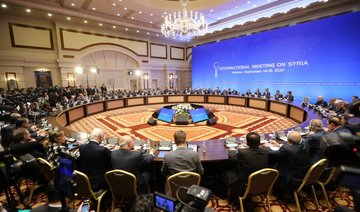DAMASCUS: Syria’s foreign ministry said Saturday that it would consider Turkish ground troops expected to temporarily monitor a safe zone deal in the country’s northwest as “illegitimate.”
The comments came a day after regime allies Russia and Iran agreed with opposition backer Turkey to jointly police a “de-escalation” zone in Syria’s Idlib province.
Damascus’s delegate to the talks, Bashar Al-Jaafari, had described them as successful but the foreign ministry in Damascus on Saturday criticized Turkey.
“These agreements on de-escalation zones do not grant any legitimacy to a Turkish presence on Syrian territory,” a source from the ministry told state news agency SANA.
“It is an illegitimate presence,” the source added, while recognizing that the accord “is temporary.”
The Idlib zone is the fourth such area to be agreed among Turkey, Russia, and Iran after two days of talks in Kazakhstan aimed at easing the six-year Syria conflict.
Under the deal, a total of four de-escalation zones would be set up, each for a six-month period which could be renewed.
Three zones are already in place — in Eastern Ghouta near Damascus, in central Homs, and in parts of southern Syria — and are being monitored by Russian military police.
Idlib province, which lies along Syria’s border with Turkey, was widely expected to be the most complex zone to establish.
Much of it is held by Hayat Tahrir Al-Sham (HTS), an alliance of fighters dominated by Al-Qaeda’s former Syrian affiliate.
In the Kazakh capital Astana on Friday, Turkey, Russia and Iran agreed “to allocate” their forces to patrol Idlib and parts of the neighboring Latakia, Hama and Aleppo regions.
Turkey has long backed rebels in Syria’s six-year conflict and intervened directly in August 2016 to fight the Daesh group as well as Kurdish militias it sees as “terrorists.”
Syria’s government regularly complains about Turkey’s intervention to the United Nations and says its military activities on Syrian soil constitute a violation of its sovereignty.
“The Astana deal is an international deal respected by Syria,” Waddah Abed Rabbo, editor-in-chief of the Al-Watan daily, which is close to the government, told AFP.
“But it doesn’t at all legitimize the presence of foreign powers — Turkish or otherwise — on Syrian soil without direct coordination with Syria’s government,” Abed Rabbo said.
More than 330,000 people have been killed and millions more displaced since Syria’s crisis erupted in March 2011.
Syria says Turkish monitors in safe zone would be ‘illegitimate’
Syria says Turkish monitors in safe zone would be ‘illegitimate’

Israel’s settler movement takes victory lap as a sparse outpost becomes a settlement within a month

- Smotrich, who has been in charge of Israeli settlement policy for the past three years, has overseen an aggressive construction and expansion binge aimed at dismantling any remaining hopes of establishing a Palestinian state in the occupied West Bank
YATZIV SETTLEMENT, West Bank: Celebratory music blasting from loudspeakers mixed with the sounds of construction, almost drowning out calls to prayer from a mosque in the Palestinian town across this West Bank valley.
Orthodox Jewish women in colorful head coverings, with babies on their hips, shared platters of fresh vegetables as soldiers encircled the hilltop, keeping guard.
The scene Monday reflected the culmination of Israeli settlers’ long campaign to turn this site, overlooking the Palestinian town of Beit Sahour, into a settlement. Over the years, they fended off plans to build a hospital for Palestinian children on the land, always holding tight to the hope the land would one day become theirs.
That moment is now, they say.
Smotrich goes on settlement spree
After two decades of efforts, it took just a month for their new settlement, called “Yatziv,” to go from an unauthorized outpost of a few mobile homes to a fully recognized settlement. Fittingly, the new settlement’s name means “stable” in Hebrew.
“We are standing stable here in Israel,” Finance Minister and settler leader Bezalel Smotrich told The Associated Press at Monday’s inauguration ceremony. “We’re going to be here forever. We will never establish a Palestinian state here.”
With leaders like Smotrich holding key positions in Israel’s government and establishing close ties with the Trump administration, settlers are feeling the wind at their backs.
Smotrich, who has been in charge of Israeli settlement policy for the past three years, has overseen an aggressive construction and expansion binge aimed at dismantling any remaining hopes of establishing a Palestinian state in the occupied West Bank.
While most of the world considers the settlements illegal, their impact on the ground is clear, with Palestinians saying the ever-expanding construction hems them in and makes it nearly impossible to establish a viable independent state. The Palestinians seek the West Bank, captured by Israel in 1967, as part of a future state.
With Netanyahu and Trump, settlers feel emboldened
Settlers had long set their sights on the hilltop, thanks to its position in a line of settlements surrounding Jerusalem and because they said it was significant to Jewish history. But they put up the boxy prefab homes in November because days earlier, Palestinian attackers had stabbed an Israeli to death at a nearby junction.
The attack created an impetus to justify the settlement, the local settlement council chair, Yaron Rosenthal, told AP. With the election of Israel’s far-right government in late 2022, Trump’s return to office last year and the November attack, conditions were ripe for settlers to make their move, Rosenthal said.
“We understood that there was an opportunity,” he said. “But we didn’t know it would happen so quickly.”
“Now there is the right political constellation for this to happen.”
Smotrich announced approval of the outpost, along with 18 others, on Dec. 21. That capped 20 years of effort, said Nadia Matar, a settler activist.
“Shdema was nearly lost to us,” said Matar, using the name of an Israeli military base at the site. “What prevented that outcome was perseverance.”
Back in 2006, settlers were infuriated upon hearing that Israel’s government was in talks with the US to build a Palestinian children’s hospital on the land, said Hagit Ofran, a director at Peace Now, an anti-settlement watchdog group, especially as the US Agency for International Development was funding a “peace park” at the base of the hill.
The mayor of Beit Sahour urged the US Consulate to pressure Israel to begin hospital construction, while settlers began weekly demonstrations at the site calling on Israel to quash the project, according to consulate files obtained through WikiLeaks.
It was “interesting” that settlers had “no religious, legal, or ... security claim to that land,” wrote consulate staffer Matt Fuller at the time, in an email he shared with the AP. “They just don’t want the Palestinians to have it — and for a hospital no less — a hospital that would mean fewer permits for entry to Jerusalem for treatment.”
The hospital was never built. The site was converted into a military base after the Netanyahu government came to power in 2009. From there, settlers quickly established a foothold by creating makeshift cultural center at the site, putting on lectures, readings and exhibits
Speaking to the AP, Ehud Olmert, the Israeli prime minister at the time the hospital was under discussion, said that was the tipping point.
“Once it is military installation, it is easier than to change its status into a new outpost, a new settlement and so on,” he said.
Olmert said Netanyahu — who has served as prime minister nearly uninterrupted since then — was “committed to entirely different political directions from the ones that I had,” he said. “They didn’t think about cooperation with the Palestinians.”
Palestinians say the land is theirs
The continued legalization of settlements and spiking settler violence — which rose by 27 percent in 2025, according to Israel’s military — have cemented a fearful status quo for West Bank Palestinians.
The land now home to Yatziv was originally owned by Palestinians from Beit Sahour, said the town’s mayor, Elias Isseid.
“These lands have been owned by families from Beit Sahour since ancient times,” he said.
Isseid worries more land loss is to come. Yatziv is the latest in a line of Israeli settlements to pop up around Beit Sahour, all of which are connected by a main highway that runs to Jerusalem without entering Palestinian villages. The new settlement “poses a great danger to our children, our families,” he said.
A bypass road, complete with a new yellow gate, climbs up to Yatziv. The peace park stands empty.














